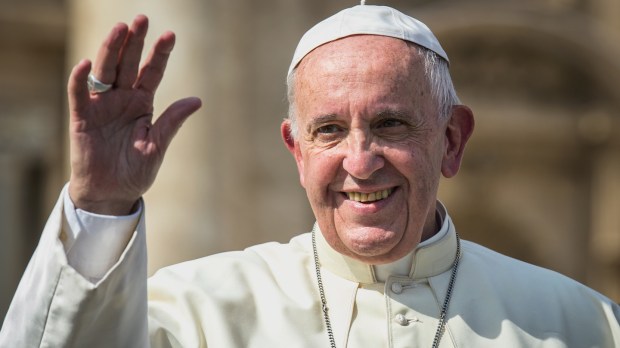VATICAN CITY — At his general audience today, Pope Francis continued his series of reflections on hope.
Addressing faithful and pilgrims from around the world in St. Peter’s Square, as spring temperatures return to Rome, the pope reflected the Letter of St. Paul to the Romans, Chapter 15, verses 4-5:
We who are strong ought to bear with the failings of the weak, and not so as to please ourselves; let each of us please his neighbor for his good, to edify him. For Christ did not please himself; but, as it is written, “The reproaches of those who reproached thee fell on me.” For whatever was written in former days was written for our instruction, that by steadfastness and by the encouragement of the scriptures, we might have hope. May the God of steadfastness and encouragement grant you to live in such harmony with one another, in accord with Christ Jesus, that together you may with one voice glorify the God and Father of our Lord Jesus Christ. (Rom. 15:4-5)
Here is an English translation of the full text of the Pope’s general audience address:
Dear brothers and sisters,
For some weeks, the Apostle Paul has been helping us to better understand what constitutes Christian hope. We said that it is not optimism; it is something else. And the Apostle helps us to understand this. Today he does so by comparing it with two attitudes which are of the utmost importance for our lives and our experience of faith: “steadfastness” and “encouragement” (Rom. 15:4-5). In the passage from the Letter to the Romans we have just heard, they are mentioned twice: first in reference to the Scriptures, and then to God himself. What is their deepest, truest meaning? And how do they shed light on the reality of hope? These two attitudes: steadfastness and encouragement.
Steadfastness could also be called patience: it is the ability to endure, to bear on one’s shoulders, to “carry-on,” to remain faithful, even when the burden seems to become too heavy, and unbearable, and we are tempted to judge negatively and abandon everything and everyone.
Encouragement, on the other hand, is the grace to be able to grasp and show, in every situation, the compassionate presence and action of God.
Now, St. Paul reminds us that steadfastness and encouragement are transmitted to us in a special way through the Scriptures (v.4), that is, by the Bible. Indeed, first the Word of God leads us to turn our gaze to Jesus, to know him better, and to conform ourselves to him, to resemble him more and more. Second, the Word reveals that the Lord is truly “the God of steadfastness and encouragement” (v. 5), who remains ever faithful to his love for us, i.e., who is steadfast in his love for us. He never tires of loving us! He is steadfast: he loves us always! And he takes care of us, covering our wounds with the caress of his goodness and mercy, that is, he encourages us. He also never tires of encouraging us.
In this perspective, we also understand the Apostle’s initial statement: “We who are strong ought to bear with the failings of the weak, and not to please ourselves” (v. 1). The phrase “we who are strong” might seem presumptuous, but according to the logic of the Gospel we know that it is not. Indeed, it is just the opposite, because our strength does not come from ourselves but from the Lord. Whoever experiences in his own life the faithful love of God, and his encouragement, is able — indeed, he is obliged — to remain close to his weakest brethren and bear with their frailty. If we remain close to the Lord, we will have the strength to be close to the weakest, the neediest, and to encourage and strengthen them. This is what it means. We can do so without complacency, but simply by feeling we are like a “channel” that transmits the Lord’s gifts. In this way, we concretely become “sowers” of hope. This is what the Lord asks of us: through this strength and capacity to encourage, to be sowers of hope. Sowing hope is needed today, but it is not easy.
The result of this style of life is not a community in which some are “first class,” i.e. the strong, and others are “second class,” i.e. the weak. The result, instead, as St. Paul says, is to “live in harmony with one another, in accord with Christ Jesus” (v. 5). The Word of God nourishes a hope that translates concretely into sharing and mutual service. For even those who are “strong” sooner or later experience their frailty and the need to be comforted by others; and likewise, in weakness one can always offer a smile or a hand to a brother in difficulty. It is this kind of community that “with one mind and one voice glorifies God” (cf. v. 6).
But all of this is possible if we put Christ and his Word at the center, for he is the “Strong One.” He is the one who gives us strength, who gives us patience, who gives us hope, and who gives us encouragement. He is the “strong brother” who takes care of each one of us. Indeed, we all need to be carried on the shoulders of the Good Shepherd and to feel enveloped by his tender and attentive gaze.
Dear friends, we can never thank God enough for the gift of his Word, which makes him present in the Scriptures. There, the Father of Our Lord Jesus Christ reveals himself as “the God of steadfastness and encouragement.” And there, we come to know that our hope is not based on our abilities and strengths, but on the support of God and his faithfulness to his love, that is, on the strength and encouragement of God. Thank you.
Translation by Diane Montagna of Aleteia’s English edition.

